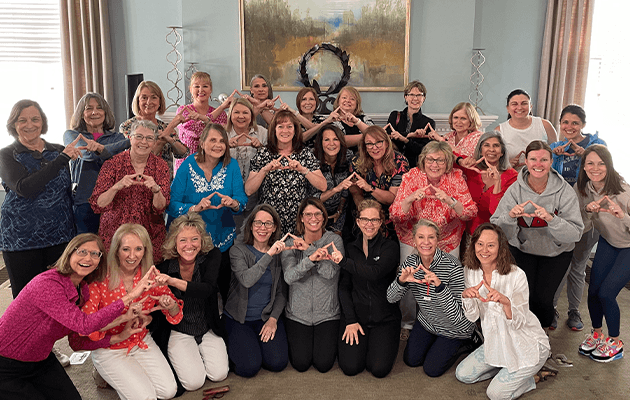You’re out with new friends, attending your child’s college football game or simply grocery shopping. You strike up a conversation with the women around you and discover they’re also Tri Deltas. Instantly, a connection is made. No need for introductions; the shared identity sparks laughter, story-swapping and experiences being compared. It’s not just a chat; it’s a unique moment, a bond exclusive to those who wear the Stars and Crescent.
When we ask our members to describe “What is Tri Delta?” their response is often heartfelt and simple. “Tri Delta is home. Tri Delta is family. Tri Delta is belonging.” While we define Tri Delta as “an assembly of women with shared values” our members’ connection to Tri Delta goes beyond a mere description. They understand how it makes them feel before they fully grasp its impact.
Former Sarah Ida Shaw Award winner Lisa Sernett, California/Berkeley, would agree. Lisa moved around a lot as a child. The Tri Delta house became the longest home she’d ever known, and her sisters became her true family. After a career that kept her on the go, she settled back in Northern California. Now, she cherishes regular dinners with her Tri Delta sisters, a tradition they’ve kept alive since she was 24.
According to Lisa, these get-togethers have been her lifeline during tough times. In a life shaped by relationships, Lisa made a random choice at 18 and, nearly 40 years later, she still loves, appreciates and admires her Tri Delta sisters. The emotional impact of Tri Delta is what resonates. The power of relationships formed within Tri Delta is immeasurable, providing a sense of belonging and support that still holds meaning and importance years later.
But are sororities still relevant in 2024?

Ask anyone unfamiliar with the Greek system and they’ll tell you belonging to a sorority or fraternity is akin to buying your friends. Open any publication and you’ll find a negative article depicting Greek life as an example of poor behavior, partying, hazing or worse. Why is it so difficult to convey the Greek experience to those who are not part of it? Why does membership seem so different from its reality to others? How do we communicate the need and relevance of membership?
Perhaps the answer comes in sharing what these organizations are doing right
Preparation for the work ahead
According to a Gallup poll commissioned by two advocacy organizations, the National Panhellenic Conference (NPC) and the North American Interfraternity Conference (NIC), fraternity and sorority members are more likely to form relationships with mentors and professors and engage in internships relevant to their college classes. In addition, over half of fraternity and sorority alumni secured a job immediately after or within two months of graduating, compared to only 36 percent of unaffiliated graduates. Greek alumni report feeling more engaged in their current jobs and more satisfied with their lives.
Mandy Chick, Rose-Hulman, student, race car driver and one of our esteemed 33 Under 33, attributes much of her success—on and off the track—to Tri Delta. She credits the sorority for connecting her with valuable internships, particularly at General Motors. Mandy’s chapter sisters are her biggest fans, consistently cheering for her and providing unwavering support. Leadership skills gained, strengthened and honed by being her collegiate chapter’s president are also part of what has set Mandy up for a successful future.
The results of the Gallup survey also underscore strong connections between fraternity and sorority membership and feelings of preparation for life after college. The skills and confidence gained through membership also extend to entrepreneurship, and shared values and close friendships often lead to the creation of successful businesses. One inspiring example is Panic Panties, a thriving business founded by Katherine Connolly, Maria-Nicole Marino and Alexandra Tartel, who are not only best friends but also Tri Delta sisters from Syracuse.
Their remarkable journey began with a groundbreaking idea scribbled on a cocktail napkin, which they transformed into a thriving business. Working together with their closest friends every day, they attribute this incredible experience to the profound influence of Tri Delta in their lives. The story of Panic Panties showcases the impact of Tri Delta in fostering a supportive and empowering environment. Through their shared values and the bonds during their collegiate years, these Tri Delta sisters turned their vision into a reality, exemplifying the spirit of determination, collaboration and success.
Devotion to their universities
Greek alumni also look back on their undergraduate years more fondly, with almost two-thirds recommending their university to others and a significant 54 percent contributing to their alma mater in the past year, compared to only 10 percent of unaffiliated alumni.

Research funded by fraternity and sorority advocacy groups supports these positive findings, indicating higher graduation rates, increased rates of re-enrollment and more involvement in student life. An analysis of national survey data conducted by a University of Indiana researcher in March 2020 revealed that fraternity and sorority members were significantly more engaged in college life, reported greater gains in learning and reported higher satisfaction with their college experiences than non-members.
Members are so fond of their experiences that they feel compelled to give back for a lifetime. For Janine Gracy, Kansas, Tri Delta holds a special place in her heart. Living in Lawrence with her husband, she passionately supports the new Theta Omega chapter home on the KU campus, contributing to ensuring future generations of women can thrive as she did. Drawing on her Tri Delta volunteer experience, she recognizes the importance of a safe and comfortable living environment, motivating her support for the Kansas housing campaign. She is excited about the redesigned spaces that foster togetherness. Janine attended a recent DDD B&B experience at KU and is thankful for the lifelong impact and lessons learned from Tri Delta.
Lifelong connection with other women
Producer of the summer 2023 hit film “Barbie” Greta Gerwig, expresses, “We are all Barbie, pushing women to see themselves as the powerful and independent beings we truly are.” We need a safe haven to grow and explore—along with strong and intimate relationships with other women for support. It sounds like Greta is talking about Tri Delta, doesn’t it?
Current research reinforces this need. Today’s college students, grappling with increasing isolation and loneliness, are actively searching for meaningful connections. A striking 75% report mental distress, with 40% seeking counseling. While sorority women face similar challenges, they express feeling more connected to their peers and are open to discussing mental health with a sister. A 2021 survey by the Postsecondary Education Research Center at the University of Tennessee found that 80% of sorority women feel supported by their sisters both personally and regarding their health and wellness.
For Tri Deltas, these meaningful connections extend well beyond the collegiate years. Reunions with chapter sisters, opportunities to volunteer, Homecoming gatherings and the like give members ways to engage for a lifetime and give back to the organizations that have been so influential in their lives. And joining a local alumnae chapter allows them to stay connected and involved while building upon the bonds and community they found while collegians in Tri Delta.

The Sorority Life Blog titled “Why You Should Join an Alumnae Chapter” reinforces the benefits of joining alumnae chapters: making connections in a new city or town, job searching and networking, supporting the local college chapter and engaging in sisterhood activities and events. Tri Delta alumna Katerina Simunkova, California/San Diego, agrees. A former Tri Delta advisor encouraged her to check out her local alumnae chapter. “Here I am, eight years later, and the women I met at that first event are now my best friends. My sisters. We’ve gone on trips to Europe together, been to each other’s weddings and attended baby showers. They’ve helped me look at houses, make important life decisions and move across the country.”
She adds that such a big move was less scary because she immediately reached out to the alumnae chapter and was instantly welcomed into the group. “Tri Delta is what you make of it. I’m glad I embraced it because it has made my life indescribably better.”
Commitment to service

Another overlooked aspect of Greek life is philanthropy. According to Greekgear.com, in their article “Should I Join a Fraternity? How Frats Help Your Resume & Future,” philanthropy and personal development go hand in hand. By participating in philanthropic activities, members build empathy and compassion. They experience personal growth and character development while also learning valuable leadership and organizational skills.
It often takes many members to successfully pull off a single fundraising effort, so members learn how to work together, communicate with each other and give back. According to the article, “You may be surprised to see how much you learn about business, government regulations, interpersonal communication and even yourself just by lending a hand and jumping in with a positive attitude.”
For many Tri Deltas, the connection with St. Jude Children’s Research Hospital is lifelong. In our 25-year partnership, we have raised nearly $100 million—and, in turn, have created generations of philanthropists. Some of our members have even received life-saving care at St. Jude.
Singer and songwriter Addie Pratt, Mississippi, was diagnosed with acute myeloid leukemia in 2016 as a high school freshman and was referred to St. Jude. Cancer-free, Addie now lives in Nashville and works with ALSAC, the fundraising arm for St. Jude. Her journey reflects the impact of St. Jude and the connection between Tri Delta and their philanthropic mission. Through it all, Addie continues to share her story and passion for philanthropy through her music, with plans to release new songs this year.
Positive partners with our universities
Dr. Bill Hardgrave, president of the University of Memphis, shared in his keynote at the Fraternity Communications Association 2024 annual conference that three factors—living on campus, making friends and joining an affinity group—all contribute to student retention in a time when college enrollment is shrinking. All three factors are obtained through Greek life, making our organizations vital partners with their university and college communities.

To many, stereotypical comments about Greek life observed only from movies and the news can be difficult to hear and equally difficult to defend—but let the research speak for itself. Members reap rewards from their affiliations, are more likely to have friends outside of the classroom, participate in extracurricular activities, gain valuable job experience and feel satisfied with their overall college experiences. And after college, the benefits continue. A majority of affiliated alumni are thriving in various aspects of their well-being, with 62% feeling positive about their career well-being, 66% in community well-being, 51% in financial well-being, 53% in physical well-being and 62% in social well-being.
While the negative aspects and criticisms surrounding Greek life may persist, it is evident from research and findings that for those who diligently strive to harness the positive aspects, the benefits far outweigh the drawbacks. Fraternity and sorority members excel academically, develop strong interpersonal skills and demonstrate higher rates of lifelong civic engagement compared to their non-Greek peers. Furthermore, the lifelong friendships and sense of belonging fostered within Greek communities are invaluable assets that contribute to overall well-being long after graduation. While acknowledging the challenges, it’s imperative to recognize and celebrate the positive impact that Greek life can have on individuals, campus life and society as a whole.
The value of sororities as a space available for women to grow, explore and support each other in the world is important now more than ever. Tri Delta provides the ultimate affinity space where women can feel safe to develop leadership skills, become strong and confident, and build lifelong sisterhood. When asked, Tri Delta members echo the multitude of benefits Tri Delta provides from professional successes and leadership experience to philanthropic engagement, assistance with their careers and fun through their local alumnae chapter. Some of our members have zig-zagged their ways through adult life, but they always find their way back to the sorority, constantly reminded of the Tri Delta values that have always been a guiding compass in their lives. More importantly, these women credit their membership in Tri Delta as the driving force behind it.

